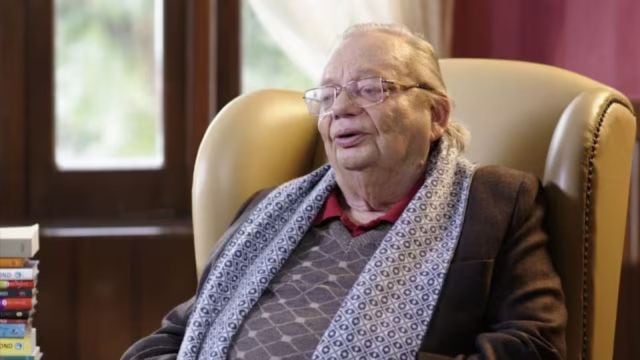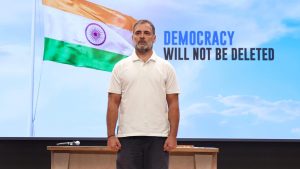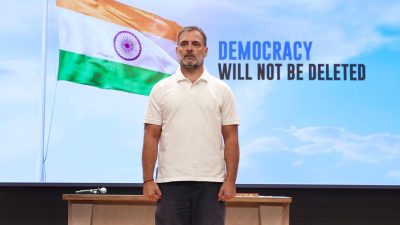Country’s first Ruskin Bond International School to open in Gujarat; with a focus on nature, emotional development
Launched by the author’s grandson, the school will bring Bond’s stories into education, with colourful classrooms themed on mountains, rainbows and oceans. ‘We intend to make sure that students experience music, nature walks and other activities,’ said Siddharth Bond
 For Bond, the school represents a way to bring nature back into education. (File image)
For Bond, the school represents a way to bring nature back into education. (File image)After being part of school curricula for decades, stories of legendary author Ruskin Bond will now come alive in a nature-themed school in Gujarat — the first franchise of the Ruskin Bond International School (RBIS) in the country. An initiative of the writer’s adopted grandson, Siddharth Bond, the school is set to open on Sunday, October 26.
The brand was launched in January this year in Mussoorie to mark the author’s 91st birthday. The first franchise in Gujarat’s Vadodara is in partnership with Advocate Kunal Sharma as well as President of Chhatra Sansad and Chartered Accountant-educationist Utpal Shah. The school aims to impart education based on the principles of “Nature, Nurture and Nourish”, intertwining Bond’s stories with modern learning.
The fact that Bond spent the first six years of his childhood in Jamnagar, Gujarat — where his father ran a school for the royal family — makes it fitting that the first school to carry forward his legacy is being set up in the state.
Ruskin Bond told The Indian Express, “We only left Jamnagar when World War II broke out… I was sent to a boarding school. I have fond memories of my childhood in Kathiawar… I have not lived in Vadodara but I remember passing through several times. It is a city with a history, a culture of its own and a very vibrant part of Gujarat and of India. It is an ideal place… I am so happy that the school is starting in Gujarat and in Vadodara.”
Several of Bond’s characters and stories will become part of the curriculum that is being “painstakingly curated”. A popular Bond character, Rusty from The Adventures of Rusty, based on Bond’s own childhood experiences growing up in Dehradun — will be brought to life in the pre-primary classrooms when the school launches.
Bond said, “The first six years of my life were spent in Jamnagar, a small state on the Kathiawar coast, where my father ran a sort of palace school for the royal children, particularly the girls, who, in those days, were not sent out to school. I have very vivid memories of that time — of the palace area, the little porch… Rozi Bandar, Bedi Bandar and the seashore where we would go. For me, it is still a very fairy-tale atmosphere. Jamnagar also was the home of Indian cricket, as it was ruled by Ranjitsinhji and his nephew Duleepsinhji.”
With colourful classrooms themed on mountains, rainbows and oceans inspired by Bond’s stories, the school aims to be a trendsetter for storytelling and academics.
Sharma, who is partnering with Siddharth Bond to expand the RBIS model, said, “Ruskin Bond has always been celebrated as an author and when his grandson, in a meeting in Goa, expressed his interest, we took the opportunity. Ruskin Bond’s love for nature and for children gets into early education and will help us bring childhood back into education with nature walks, creative writing, storytelling sessions — not just textbooks or academic readiness but also emotional development, love for life, forests, trees, water, oceans and music.”
Shah added that the research team curating the curriculum is also considering incorporating elements from Japanese elementary schools that focus on cleanliness and chores, giving students hands-on experience while blending it with Bond’s stories like Till the Clouds Roll By and chapters on the trees of Dehradun — with integrated lessons in math and science.
With plans to expand into a K-12 school model and multiple franchises across the country, Sharma said RBIS will ensure outdoor learning. “We intend to make sure that students get out of their classrooms… We would be making them experience music, nature walks and other activities,” he said.
For Bond, the school represents a way to bring nature back into education. “This whole project was a vision of my grandson, Siddharth Bond. He has worked very hard on it. I hope there will be more schools… The appreciation of nature and all that it offers us will be a part of our education. Over the years, human civilisation has put nature on the back foot. It has gone out of its way to trample on it, in a way. As a result, we are the ones who have suffered — climatically and in many other ways. Nature education is an essential part of our all-round education. I will be very happy if it is a part of the teaching that will take place in this school and in others.”
Bond added that while he had shied away from social media at first, he now sees it as a bridge that reduces the learning gap in smaller cities. “Social media certainly helps spread literature. I remember times when you lived in a small town in India and you wanted a book, but you could not get it unless you travelled to a big city. Today, you can get it online… Technology has helped and social media helps you with what is happening. Being an old-school person, at first I backed away from it, but I embrace it now and it is a vibrant part of modern-day life and spreading education,” he said.







